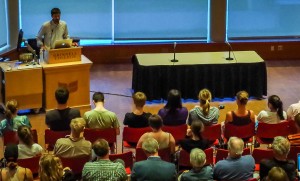Jonathan Bloom spoke in JRC 101 on Tuesday about the social, environmental and economic costs of food waste. His talk, titled “The Food Not Eaten: How America Wastes Half its Food and Why it Matters,” comes following recent conversation on campus about how to change our behaviors of consumption and reduce food waste. Jonathan Bloom is a journalist, food waste activist and author of American Wasteland, which chronicles the perils of the current waste crisis and presents effective measures that can and should be taken to mitigate it. The S&B’s Gabe Singer ’15 spoke with Bloom following the presentation.

What has been the response, post-release of your book, from the industrial farming community?
I don’t know that the industrial farming community has paid much attention to the issues because they are the ones who waste the least because they harvest in a mechanized way. They usually harvest all that they have planted. I don’t think that they are paying much attention to food waste, unfortunately. Most of the food being wasted is happening in households and on farms with crops that are handpicked.
Do you think that less food would be wasted if more people ate vegetarian?
Yes. You are wasting less food if you are eating as a vegetarian because meat is a very inefficient food the way we produce it. One calorie of meat needs ten calories of grain to produce it. So, from an efficiency standpoint, it makes a lot of sense to eat as a vegetarian. Furthermore, when you are eating as a vegetarian, you tend to be a more mindful eater and I have found that that, in general, leads to less waste.
Did you ever feel in danger or at risk in writing your book, like you were uncovering a truth that players in the food industry wanted to remain concealed?
I never felt in danger personally. But I found that there were plenty of people in the retail food environment that don’t want to think about food waste and there are plenty of people in the agricultural circles who dislike the amount of food waste. Some are embarrassed about the amount of waste that is happening on their farms. Even for people in the Department of Agriculture, there might be a bit of reticence to talk about food waste because they see it as something that they could be doing a better job about curtailing, but they aren’t. Whenever I would talk to people about food waste, I was always careful about the semantics. When you use the words “food waste” with some people it connotes culpability or guilt. If you are a journalist and you want to get people to talk about the issue, you have to be careful about the language you use.
What role do you see spiritual communities playing in food waste reduction and change in consumption behaviors?
I think there’s a real role for spiritual communities to be involved in raising awareness about how much food is being wasted and then to prompt action to reduce that waste simply by being good stewards of the earth. If, in some way, your faith can lead you to that conclusion—that wasting food runs counter to theology—I think there’s a real power there and I have seen that in most faith groups that I have come across. In today’s massive agricultural system, that notion is sadly forgotten and oftentimes a bit antiquated.
To what degree do you think that some of the measures taken on college campuses that you advocate for (i.e. eliminating trays from the dining hall, organizing public awareness campaigns) could just be treatment of symptoms to a more rooted, systemic problem?
I don’t think that they are mutually exclusive. I think you can work to reduce waste on a personal level, or even on a college level, and then also try to impact the modern industrial, monoculture agricultural system. In the long run, I think it will be more helpful to reform the system directly, but I do subscribe to that idea of thinking globally and acting locally.
Closing remarks?
I think people would be amazed at how easy it is to reduce the amount of food we are wasting if we just took a step back and thought about it. It’s not difficult, its the green thing to do, it makes economic sense and its ethically sound.




























































